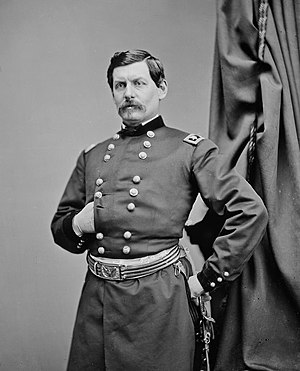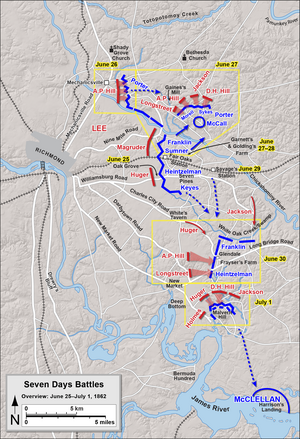After his army was beaten back at Gaines Mill, Lee decided to retreat. Only one fifth of his army had been driven back at Gaines Mill. A large portion of the army had not yet fought. Additionally, he had enough troops that he could launch an trust at Richmond while holding back Lee. He could easily break through the thin Confederate lines, and it seems likely that he could have capture the city. However, that was not to be. McClellan was badly scared. He had been convinced by his scouts that he was outnumbered. He thought the attacks on his right were only a disguise for a major effort on his left. Throwing away all thought of an attack, instead he decided to fall back to the James River, where he could be protected by the gunboats. He blamed his situation on the government in Washington:
I have seen too many dead and wounded comrades to feel otherwise than that the Government has not sustained this army. If you do not do so now the game is lost. If I save this army now I tell you plainly that I owe no thanks to you or any other persons in Washington. You have done your best to sacrifice this army."One small Confederate success had convinced McClellan to give up the work of months of campaigning, and embark on a full scale retreat, or change of base as he liked to call it. McClellan himself went to the gunboats ahead of his army, abandoning direct control of his army in the retreat.
 |
| McClellan |
Meanwhile, Lee did not sit idly by. He had his troops moving on June 28th in pursuit. He was not privy to McClellan's plans, so he had to determine whether he was going to retreat north to his base at White House, east to the James River, or attack Richmond. Sending out scouts to reconnoiter, he decided correctly that it was the second. Lee hoped to catch McClellan while his army was crossing the nearly impenetrable White Oak Swamp. He could crush one half of the army independently as it could receive little help from the rest on the other side of the swamp. This would be the best chance Lee had to destroy the Federals in the entire war, with the Federals moving across his front through favorable ground.
There was little fighting this day as the army moved, but Confederate general John B. Magruder did send out a reconnaissance in force at Golding's Farm. Although it was easily turned back, it served to further convince the Federals that they were being attacked from all sides.



0 comments:
Post a Comment